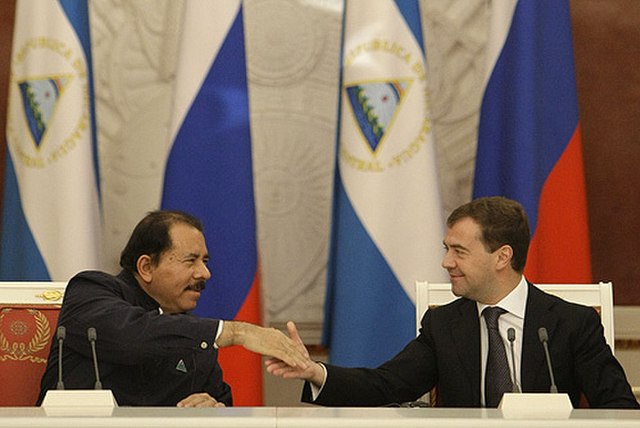What Sanctions Against Nicaragua Reveal about U.S. Geopolitical Codes

Nicaraguan President Daniel Ortega with former Russian President Dmitry Medvedev, 2008.
Jonah Carlson - The United States recently unleashed a series of new sanctions against Nicaragua and its president, Daniel Ortega. José de Córdoba explores the motivations behind these sanctions and the potential effects on both countries.
To understand U.S. motivations, one first needs to understand geopolitical codes. Geopolitical codes are an analysis of a state’s relationship with other states in the world and how these relationships create a framework for states to approach and understand international relations. The sanctions towards Nicaragua are part of a greater shift in the U.S. geopolitical code away from reliance on authoritarian regimes for resources, especially those with connections to Russia. The U.S. imposed sanctions because the Sandinista government recently cracked down on political dissidents and freedom of speech in Nicaragua. Additionally, President Ortega’s fourth electoral victory has been declared illegitimate by Western governments. These actions indicate U.S. preference for democracy in Nicaragua’s domestic politics. José de Córdoba cites Eric Farnsworth, who believes that the sanctions — mostly levied at the gold and sugar industries through a mix of asset freezing and tariffs — won’t damage either economy too drastically. This shows that the U.S. government wants to sanction authoritarian governments without placing too much hardship on the citizens of that government’s populace, which helps alleviate the concerns of an American public that has become apprehensive to foreign intervention.
To understand these sanctions, one also needs to understand relational power, especially in economics. The U.S. is willing to levy sanctions on the Nicaraguan gold industry because officials believe the country can take the economic hit. When conducting diplomacy with states holding higher-demand and higher-valued goods like oil, however, the U.S. has less flexibility. The U.S. continues to attempt to strike deals with Saudi Arabia despite its non-democratic status, reports of human rights abuses, and growing relationship with Russia due to the state’s deep connection with the global oil economy and the United States’ reliance on oil imports.

